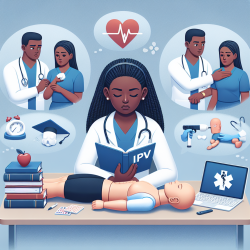The research article "Are clinicians being prepared to care for abused women? A survey of health professional education in Ontario, Canada" highlights significant gaps and opportunities in the education of health professionals regarding intimate partner violence (IPV). This blog explores how practitioners can leverage these findings to enhance their skills and improve care for abused women.
Understanding the Current State of IPV Education
The study conducted a comprehensive survey across various health professional programs in Ontario, Canada. It revealed that while 57% of programs offered some form of IPV-specific education, there is considerable variability in the content and delivery methods. Notably, undergraduate nursing and allied health programs had higher rates of IPV education compared to medical and dentistry programs.
Key Findings and Implications for Practitioners
- Content Coverage: Most programs covered basic IPV topics such as risk factors, victim characteristics, and community resources. However, fewer programs delved into identification and intervention strategies.
- Delivery Methods: IPV content is rarely delivered as standalone courses but is often integrated into broader courses or through workshops. This indicates a need for more structured and dedicated IPV training.
- Evaluation Gaps: Many programs lack formal evaluation mechanisms to assess the effectiveness of IPV education. Practitioners should advocate for more rigorous assessment methods to ensure knowledge translates into practice.
Steps for Practitioners to Enhance Their Skills
- Seek Additional Training: Engage in workshops or online courses that offer comprehensive IPV training beyond what is provided in standard curricula.
- Advocate for Curriculum Changes: Work with educational institutions to integrate more robust IPV content into health professional programs.
- Utilize Community Resources: Collaborate with local organizations that specialize in IPV support to gain practical insights and resources.
- Pursue Research Opportunities: Conduct or participate in research studies that evaluate the impact of different educational approaches on practitioner competence in handling IPV cases.
The Role of Institutions in Enhancing IPV Education
Institutions play a crucial role in shaping the quality of IPV education. The study highlights barriers such as funding limitations and competing curricular priorities that hinder the integration of comprehensive IPV training. Institutions should prioritize funding for IPV-specific materials and create opportunities for faculty development in this area.
The Path Forward: Encouraging Further Research
The findings underscore the need for continued research into effective educational strategies for IPV. Practitioners can contribute by participating in studies or advocating for more research funding. Understanding the core competencies required for effective IPV intervention will help shape future curricula and improve patient outcomes.
To read the original research paper, please follow this link: Are clinicians being prepared to care for abused women? A survey of health professional education in Ontario, Canada.










